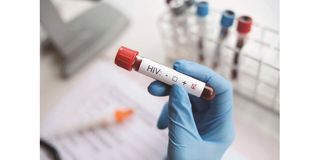Study: HIV infected mothers need peer support

Diagnostician holding a positive HIV test. A study done among the mentor mothers in south-western Kenya found peer support during pregnancy through six weeks postpartum lead to improved uptake of prevention of mother-to-child transmission services.
What you need to know:
- Study done among the mentor mothers in south-western Kenya found peer support during pregnancy through six weeks postpartum lead to improved health behaviours.
- Community‐based mentor mothers are HIV-infected women with six months to two years pregnancy experience.
HIV positive mothers adopt health-seeking behaviours when they receive peer support from community-based mentor mothers, a new study published in the Journal of the International Aids Society, says.
Community‐based mentor mothers are HIV-infected women with six months to two years pregnancy experience, and provide peer support to pregnant or postpartum HIV positive women to boost their adherence to antiretroviral therapy, retention in HIV care and prevent perinatal transmission of HIV.
The study done among the mentor mothers in south-western Kenya found peer support during pregnancy through six weeks postpartum lead to improved uptake of prevention of mother-to-child transmission services and health behaviours.
The mentor mothers help the HIV positive mothers go for the related care, seek prevention of mother-to-child transmission and maternal and child health services. They also collect medication for them alongside assisting them to develop birth plans and budget for their household finances to accommodate the new family member.
New-borns
With this, the study found an improvement in the expectant women adhering to antiretroviral therapy and deciding to deliver at a health facility. The support also enable them become more receptive to having their new-borns receive immunisations and sticking to safe infant feeding.
Apart from helping the expectant women live healthier lives, the work of the mentor mothers is equally influential in changing communities’ negative perceptions towards women with HIV.
“Being a community mentor mother has helped me in so many ways, the people who looked down upon me now view me as a person of value. One that can impart some knowledge on them,” a mentor mother is quoted in the study.
They, however, cited the women's initial non-disclosure of HIV status to their male partners as the greatest challenge that frustrates their work.
Physical abuse
“Disclosure to a male partner was avoided by women due to their fears of being blamed for bringing HIV into the relationship, physical abuse and possibly being forced to leave the home,” the researchers found.
“The context of disclosure became even more complex in polygamous marriages,” they further report.
According to Unicef, the number of children living with HIV in Kenya fell from 180,000 in 2010 to 111,500 in 2020, partly due to improved access to services, including for more pregnant women.





